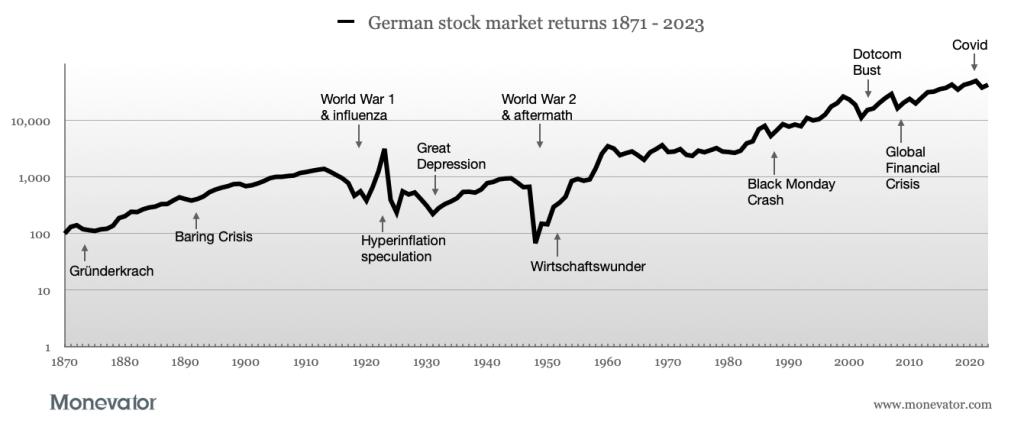
What caught my eye this week.
Every decade or so, some rebellious storyteller escapes out the back door of an investment bank, breaks the code of omertà, and tells all on how top-tier financial services really work.
Michael Lewis and Liar’s Poker in the 1980s. Nick Leeson with Rogue Trader in the 1990s. Why I Left Goldman Sachs by Greg Smith in 2012.
And now Gary Stevenson with The Trading Game.
Think the lovechild of Liar’s Poker and Rogue Trader with a dash of Thomas Piketty on the side. You won’t be able to put it down, unless you hate swearing or laughing out loud.
You’ll probably learn something, too. I certainly did.
All the usual tropes are present. The ninth dan obscenities. Wanton moneymaking. The guys who can’t say no to anything, including just another day in the office.
In some ways it’s almost a relief.
I mean, I’m as allergic to excessive wokery as the next Gen X-er, and it’s honestly nice to hear that filthy-mouthed fishwives could still find soulmates in the City, if only they could make it to the 35th floor of the appropriate temple of finance.
On the other hand, if Stevenson is to be believed – and he comes across as very believable – then the Monopoly-money mentality easily shook off bankers becoming pariahs in the 2007-2009 financial crisis.
And that’s not so easy to cheer.
The remunerative mill
It’s hard to remember how revered financial services once was, before the banking crash.
The market was always right, we were told. Risk had been smoothed away. A bunch of my university peers went to work for big banks – and you’d think they’d joined the priesthood.
When the financial system tottered in 2008 and 2009, they got a bashing of course. Yet how much really changed?
Most of my complaints from 2009 about financial services – especially its ludicrous salaries – still seem true today.
Consider, say, vanilla equity fund managers. Almost all nice people as far as I can tell. They work hard, speak eloquently, and yet nearly all fail at the one thing they’re paid to do – beat their benchmark. A return an index fund can deliver for ten basis points nowadays.
Yet these managers are still paid very handsomely, every year. Even as passive investing eats up their assets as inexorably as The Blob.
Imagine if highly-paid dentists routinely left your teeth worse than they found them – and yet still got, well, highly-paid.
Wouldn’t something change?
Maybe the high pay is inevitable. My longstanding theory is an excess income is just a perk of any job that involves dealing with a lot of money.
This sounds trite but I’m serious.
Working in the money mine
Back in school a friend’s mum worked for the Smiths crisps factory. There were always boxes of crisps at their house.
When I volunteered in a charity clothes shop on Saturday as a student, we got the first pick of the fresh donations.
An estate agent I knew didn’t even bother to list the best doer-uppers that came to him. He did them up himself.
Get a job in the video games industry and you get free Xbox games. Work behind a bar and you’ll never be short of a drink.
Secure a role in finance and there’s money everywhere. Soon some of it will fall into your pockets. You don’t even have to do anything illegal.
There’s a scene early in The Trading Game, where Stevenson makes £77,000 for his employer in a few minutes – just apropos of a casual, random conversation with the bloke at the desk next to him. He’s not yet even a proper trader with his own P/L at this point.
Moreover just a year or two later he’s able to put on a ten-figure trade, apparently because his new boss doesn’t know what his real job is.
As Joachim Klement says in his review at Klement on Investing:
The key achievement of Gary is that he paints his colleagues and himself as both sympathetic people you want to hang out and have a beer with and at the same time people who completely lack any sense of ethics and are driven only by their unbridled greed.
And it paints a vivid picture of how – at least in the 2000s and early 2010s – major banks let these guys run rampant without any real checks on their behaviour or the risks they take.
“Money money money, must be funny, in a rich man’s world…”
Nice work if you can get it
I’m not saying financial services jobs aren’t difficult or competitive or useful. Or that people don’t work long hours and get burnout.
But I do say plenty of jobs fit that description. Everyone from hrdwrkn nurses to software developers to street cleaners.
Yet they don’t get paid six-figures in their mid-20s to do it. In part because they don’t work with money.
Perhaps you think the free market would have flushed out this excessive self-enrichment if it wasn’t actually warranted?
Maybe, but I’d point you again to the fund managers who we all know mostly fail. They’re still coining it. It doesn’t look like ruthless capitalism at its finest.
Think too about who sets financial service salaries. Yes – other people in financial services. It’s almost a Ponzi scheme.
(This becomes very apparent if you study the accounts of any firms with big investment banking divisions, incidentally. It sometimes seems a miracle that shareholders get any share at all.)
I know I sound self-righteous. To be clear if you’re working at an investment bank and making a fortune by being in the right place at the right time, deploying other people’s money without taking any risk with your own – then truly, good for you.
I’m saying it shouldn’t happen like this. Or at least not so trivially.
Not that you shouldn’t do it, if you want to. Seize the opportunity!
In fact, I expect many more will want if they read Stevenson’s book, the same way the Liar’s Poker expose recruited a new generation of bond traders. Stevenson’s story is so entertaining, even as it darkens.
Actually, better than reading it, hear it as an audiobook.
Stevenson – an ex-grime MC – sounds like one of the cast of TopBoy interning with Gordon Gecko. He’s poetic, compelling, foul-mouthed, and very funny. I was left feeling more informed, but also a bit dirty.
Perhaps I’ll turn to Private Equity: A Memoir next, as a cleanser. (Thoughts on that over at The Lefsetz Letter).
Have a great long weekend! Even more links than usual to get you through to Tuesday…
From Monevator
Vanguard target retirement funds review – Monevator
From the archive-ator: the struggle for the soul of FIRE – Monevator
News
Note: Some links are Google search results – in PC/desktop view click through to read the article. Try privacy/incognito mode to avoid cookies. Consider subscribing to sites you visit a lot.
Renting now cheaper than buying in nearly all UK regions – Halifax
Biggest 25 ISA holders have amassed pots worth an average of £11.3m each – This Is Money
“You feel powerless”: homeowners facing huge ground rent increases… – ITV
…while elsewhere a one-bed flat’s service charge is hiked to £16,000 a year – BBC
New post-Brexit tariff to hit car exports to Canada – BBC
Peter Mandelson dismisses prospect of UK rejoining EU – Guardian
Blackrock’s [US] spot Bitcoin ETF already holds 250,000 Bitcoin – The Block
Minimum wage UK’s ‘most successful economic policy in a generation’ – Guardian
Daniel Kahneman: Nobel Prize-winning behavioural economist dies – BBC
Housing is more expensive in the UK than in any other OECD country – Resolution Foundation
London markets doom-loop mini-special
UK venture capital investment slumps to lowest level since Brexit – City AM
Fears over ‘uninvestable’ London market as more firms tipped to leave – Standard
The hunt for good value UK stocks [Search result] – FT
Products and services
Yorkshire Building Society launches a 1% deposit mortgage… – Sky
…while Santander, HSBC, and Barclays slash mortgage rates – This Is Money
Get £200 cashback when you open a new SIPP with Interactive Investor before 5 April. Terms apply – Interactive Investor [If cookies prevent you seeing this offer for new customers, try browsing in incognito mode]
Submit a meter reading ahead of the energy price cap cut – Guardian
The Mortgage Works offers new sub-4% buy-to-let mortgage – Standard
Five schemes to help first-time buyers onto the property ‘ladder’ – Guardian
Open an account with low-cost platform InvestEngine via our link and get up to £50 when you invest at least £100 (T&Cs apply. Capital at risk) – InvestEngine
First Direct brings back £175 bank account switching offer – Which
Beware of the gift card ‘draining’ scam – This Is Money
City boltholes for sale, in pictures – Guardian
Comment and opinion
In your 30s and 40s? Say goodbye to ever retiring – Independent
David Willets: the pension triple-lock has to go… – Conservative Home
…but Owen Jones disagrees – Guardian
Are index funds propping up the stock market? – A Wealth of Common Sense
Larry Swedroe: tracking error is a feature, not a bug – Alpha Architect
A well-written will makes life easier for your family [Search result] – FT
Financial flexibility – Best Interest
Some ‘mortgage prisoners’ owe thousands more than they borrowed decades ago… – Yahoo Finance
…but do they deserve sympathy, let alone compensation? – Gentleman’s Family Finances
JL Collins on his new FIRE book, Pathfinders [Podcast] – via Apple
Should you rent or buy a house? [US but interesting] – Of Dollars and Data
Naughty corner: Active antics
Investment trust matters [Podcast] – Far From The Finishing Post
US small-caps suffer worst run against larger stocks in over 20 years [Search result] – FT
Impersonating David Swensen is leading to Titanic losses – via LinkedIn
The highest-paid hedge fund managers, ranked – Institutional Investor
Kindle book bargains
The Success Myth by Emma Gannon – £0.99 on Kindle
Eat Shop Save by Dale Pinnock – £0.99 on Kindle
Lean In by Sheryl Sandberg – £0.99 on Kindle
The Making of a Billionaire by John Caudwell – £0.99 on Kindle
Environmental factors
Pricing climate risk – Klement on Investing
Europe’s growing ‘wolfdog’ problem – Guardian
Hydroelectricity is a hidden source of methane emissions – BBC
German village exemplifies the cancer risk from wood burning – Guardian
Lab tests found some bamboo toilet roll was 100% made of wood – Which
Robot overlord roundup
AI face recognition versus Croydon criminals – BBC
The Financial Times is testing a AI chatbot trained on its articles – The Verge
Scientists turn to AI to make beer taste even better – Guardian
BBC makes a statement on use of an AI voiceover – BBC
Life lessons mini-special
16 lessons from the ‘delinquent’ founder of Patagonia – Root of All
The riddle of happiness – More to That
A new philosophy of productivity – Cal Newport
32 years: what I’ve learned so far – Joseph Wells
The case for marrying an older man – The Cut
Off our beat
Smart words from smart people – Morgan Housel
What have 14 years of Tory rule done for Britain? – The New Yorker
London’s tallest skyscraper validates Einstein’s theory – Ian Visits
The US is having its second ‘Roaring 20s’ right now – A Wealth of Common Sense
A Q&A with psychologist and The Anxious Generation author Jonathan Haidt – Range Widely
Mental exercises to help tame stress and anxiety – Darius Foroux
Rescued baby hedgehog turns out to be a hat bobble – BBC
And finally…
“To avoid becoming embroiled in situations such as that suffered by Woodford, we could perform forensic analysis on each fund manager and attempt to decipher the many imponderables to judge future return prospects and risks. The far easier solution is to stop investing in star fund managers and the unique set of problems they bring with them.”
– Joe Wiggins, The Intelligent Fund Investor
Like these links? Subscribe to get them every Friday. Note this article includes affiliate links, such as from Amazon and Interactive Investor.
The post Weekend reading: The Trading Game appeared first on Monevator.



